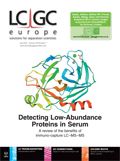10th International Conference on Packed Column SFC (pcSFC)
The 10th annual International Conference on Packed Column SFC (pcSFC) will be held 5–7 October 2016 at the Melia’ Vienna hotel in Vienna, Austria.
Photo Credit: Manchan/Getty Image

The 10th annual International Conference on Packed Column SFC (pcSFC) will be held 5–7 October 2016 at the Melia’ Vienna hotel in Vienna, Austria. The conference alternates annually between the United States and Europe and is the preeminent conference on supercritical fluid chromatography (SFC). Previous meetings were SFC 2015 Philadelphia, PA, USA; SFC 2014 Basel Switzerland; SFC 2013 Boston, MA, USA; SFC 2012 Brussels, Belgium; SFC 2011 New York City, USA; SFC 2010 Stockholm, Sweden; SFC 2009 Philadelphia, USA; SFC 2008 Zurich, Switzerland; SFC 2007 Pittsburgh, PA, USA. The symposium is dedicated to bringing scientists in industrial, academic, and government laboratories together to discuss the latest advances in packed column supercritical fluid chromatography. Each conference has been organized by the Green Chemistry Group. The complete SFC 2016 program and many of the oral and poster presentations from previous meetings and SFC 2016 can be found in their entirety at www.greenchemistrygroup.org/index.html.
SFC utilizes carbon dioxide as the main mobile phase component and can be a greener separation technology relative to high performance liquid chromatography (HPLC). pcSFC has become the method of choice for both preparative chiral and achiral separations up to 1 kg scale. In addition, analytical scale pcSFC provides a platform that affords faster separations than HPLC and can be readily interfaced with a variety of sample preparation methods. With appropriate stationary phases and mobile phase components, separation mechanisms can be normal phase, reversed phase, ion pair, and HILIC-like for example. Recent advances in analytical equipment have allowed SFC to move into validated environments, which have further expanded the use of pcSFC worldwide. With the continued growth of pcSFC as a cutting-edge technology, the conference provides a forum for new developments and applications. SFC 2016 promises to attract distinguished scientists from around the world to discuss advances in an environmentally-friendly technology.
The conference begins with a half-day short course on 5 October. Course instructors Larry Taylor (Virginia Tech), David Pinkston (Kellogg), and Larry Miller (Amgen) have a combined 50+ years of SFC experience. Topics that will be covered include: 1) History and Fundamentals of Analytical SFC, 2) Chiral and Achiral pcSFC Method Development, and 3) Preparative pcSFC. The course will be of interest to scientists with little SFC experience as well as those who are more experienced in the field.
Days two and three (6–7 October) include both oral and poster presentations. Speakers will include Caroline West and Eric Lesellier from Universite d’ Orleans, France; Lucie Novakova from Charles University Czech Republic; Eric Francotte from Norvatis, Zurich, Switzerland; Debby Mangelings from Vrije Universiteit, Belgium; and Ray McClain from Merck & Co., USA.
All topics related to pcSFC will be covered during the conference. Contributed abstracts have been submitted for both oral and poster presentations from laboratories in Sweden, Switzerland, Germany, Japan, Belgium, France, England, Czech Republic, and the U.S. Further details related to SFC 2016 can be found at http://greenchemistrygroup.org.
Program Co-Chair: Larry Taylor
E-mail: ltaylor@vt.edu
Website: http://greenchemistrygroup.org

Determining Enhanced Sensitivity to Odors due to Anxiety-Associated Chemosignals with GC
May 8th 2025Based on their hypothesis that smelling anxiety chemosignals can, like visual anxiety induction, lead to an increase in odor sensitivity, a joint study between the University of Erlangen-Nuremberg (Erlangen, Germany) and the Fraunhofer Institute for Process Engineering and Packaging (Freising, Germany) combined behavioral experiments, odor profile analysis by a trained panel, and instrumental analysis of odorants (gas chromatography-olfactometry) and volatiles (gas chromatography-mass spectrometry).
Investigating 3D-Printable Stationary Phases in Liquid Chromatography
May 7th 20253D printing technology has potential in chromatography, but a major challenge is developing materials with both high porosity and robust mechanical properties. Recently, scientists compared the separation performances of eight different 3D printable stationary phases.
Detecting Hyper-Fast Chromatographic Peaks Using Ion Mobility Spectrometry
May 6th 2025Ion mobility spectrometers can detect trace compounds quickly, though they can face various issues with detecting certain peaks. University of Hannover scientists created a new system for resolving hyper-fast gas chromatography (GC) peaks.

.png&w=3840&q=75)

.png&w=3840&q=75)



.png&w=3840&q=75)



.png&w=3840&q=75)









